Police remove tent encampment at University of Michigan protesting Israel
- Oops!Something went wrong.Please try again later.
Police removed on Tuesday a tent encampment protesting Israel on campus at the University of Michigan in Ann Arbor, ending one of the longest-running university encampments in the country this year.
In a statement, university president Santa Ono said that officials were forced to take action after the protesters refused to remove fire hazards discovered during an inspection last week by a fire marshal.
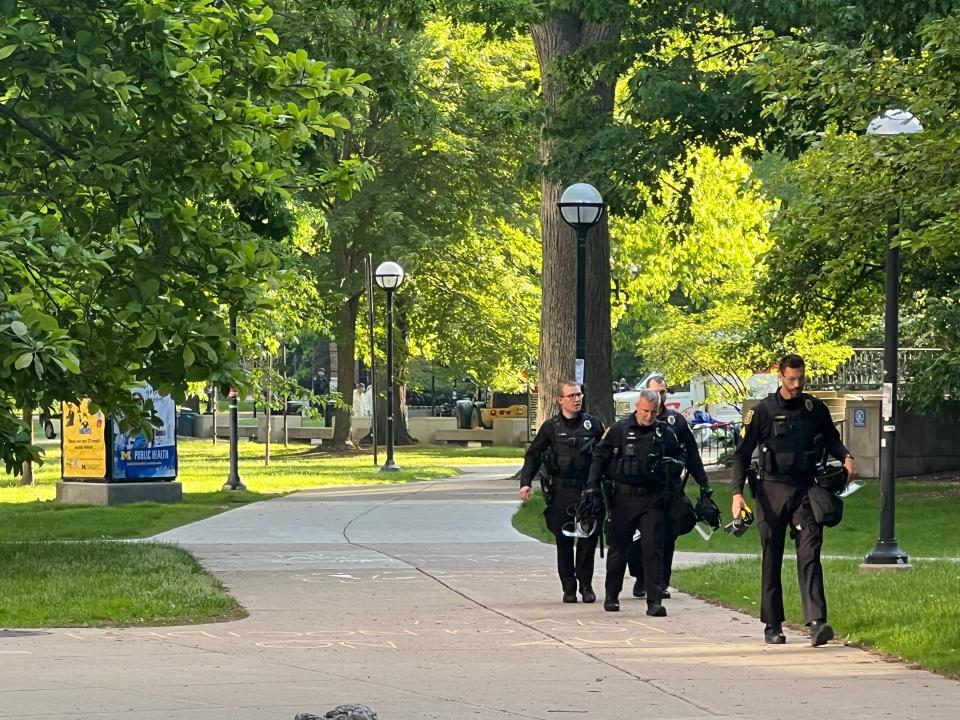
"The protesters refused to comply with these requests," Ono said. "That forced the university to take action and this morning, we removed the encampment."
Just before 6 a.m., university police and security began clearing the encampment, Melissa Overton, a spokeswoman for University of Michigan police, told the Free Press. Overton said that before the action was taken, "officers provided a handout and issued three warnings over a 15-minute period, asking participants to leave voluntarily before being subject to arrest." She did not specify whether there were any arrests or detainments. The Washtenaw County Sheriff’s Office said there were some arrests and removals of people, which they did not take part in.
While other protest sites across the U.S. were shut down by police or ended voluntarily in recent weeks, the encampment on the Diag kept on going, attracting protesters, some counterprotesters, guests and curious onlookers. That ended this morning.
Posts on X, formerly Twitter, by the TAHRIR Coalition, a group of student organizations who helped set up the encampment, show police on-site at the Diag in the center of campus, claiming that pepper spray had been used at one point. The coalition said there were three arrests. An email sent to the coalition was not immediately returned.
Overton said university police had repeatedly asked the protesters to leave.
"In recent days, encampment participants have also received numerous outreach attempts from U-M administrators and DPSS (Division of Public Safety and Security) leadership, asking them to leave," she said. "The encampment posed safety risks, both to participants and the community at large, and its presence was in violation of multiple policies and regulations. Its removal was important to help maintain the safety and security of the U-M campus community."
PEPPER SPRAY USED https://t.co/8kheSw1bT7 pic.twitter.com/lbgSNvlfYc
— TAHRIR Coalition (@TAHRIRumich) May 21, 2024
The tent encampment was set up four weeks ago on April 22 calling upon the university to divest from Israel. It echoed a tent encampment at Columbia University in New York City. While police soon shut down the Columbia encampment and similar protest sites at other universities, police in Michigan initially took a hands-off approach to the encampment in Ann Arbor. But tensions started to escalate after some protesters recently demonstrated outside the homes of some regents, including their chair.
Ono said they had no choice but to shut down the encampment.
"Ensuring that the campus is safe — for students, faculty, employees, university visitors, and protesters — is a paramount concern, which is why the university has provided 24-hour security for the encampment over the past four weeks," he said. "Following a May 17 inspection by the university fire marshal, who determined that were a fire to occur, a catastrophic loss of life was likely, the fire marshal and Student Life leaders asked camp occupants to remove external camp barriers, refrain from overloading power sources, and stop using open flames."
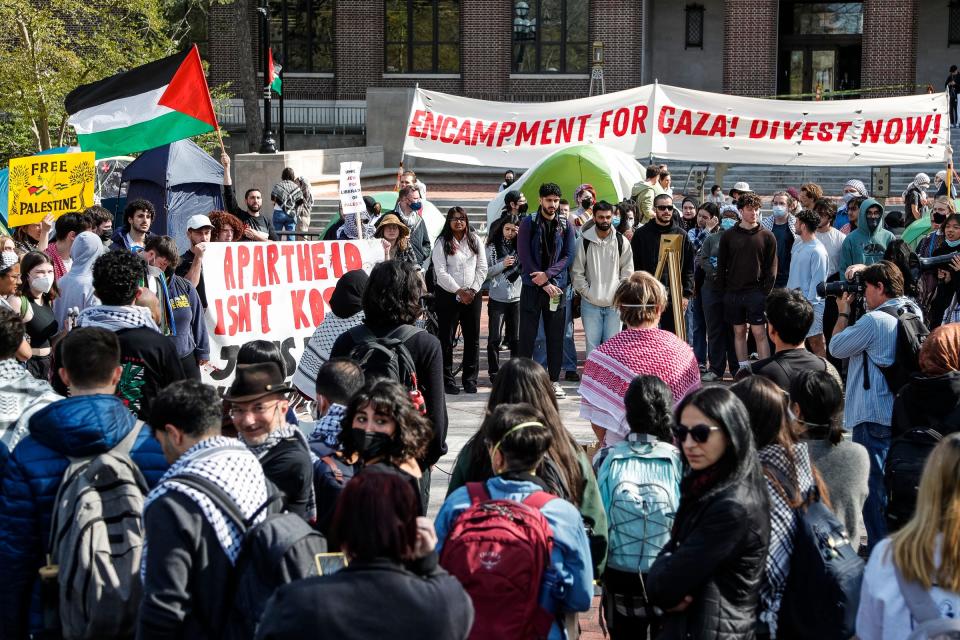
Construction equipment could be seen after 8 a.m. removing parts of the encampment. There was a U-Haul truck at the Diag, with at least one officer with a helmet, face shield and baton standing near a police vehicle parked nearby.
More: University of Michigan students set up tent encampment, demand divestment from Israel
You can see construction equipment tearing up and removing some of the encampment pieces pic.twitter.com/QI7USAwlaN
— Dave Boucher (@Dave_Boucher1) May 21, 2024
In his statement, Ono listed other disruptions to campus life caused by the protesters in recent weeks, such as at a ceremony for honors students.
"The disregard for safety directives was only the latest in a series of troubling events centered on an encampment that has always violated the rules that govern the Diag — especially the rules that ensure the space is available to everyone," Ono said.
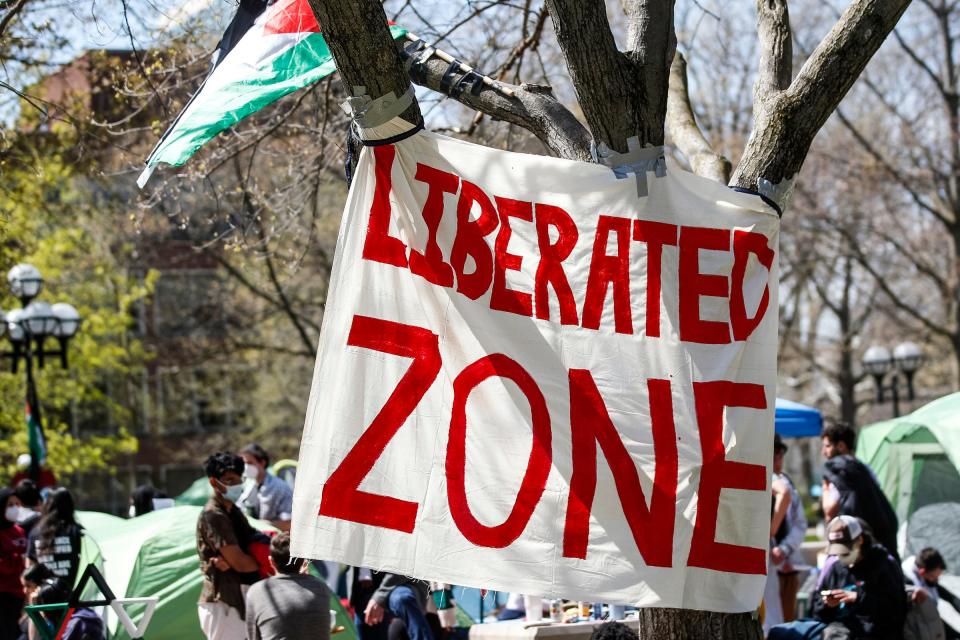
Protesters compared their struggle for divestment to the struggles for divestment from South Africa in the 1980s, when demonstrators set up a shanty on campus in Ann Arbor to symbolize the sufferings of Black people under apartheid rule. The state of Michigan passed a law in 1983 calling upon all public universities and colleges in Michigan to divest from South Africa, but the university initially fought the law in court. Divesting from Israel would be challenging since Michigan has a law prohibiting state contracts with anyone who supports divesting from or boycotting Israel. Supporters of Israel have criticized the tent encampment as being unfairly hostile to Israel and at times antisemitic. The regents have said they have no plans to divest from Israel.
Some banners at the site read: "Encampment For Gaza! Divest Now!" and "Long Live The Intifada." One banner strung up between branches on a tree read: "Liberated Zone."
More: Campus protests against Gaza attacks continue in Michigan amid national crackdown
Muslims and Jews conducted prayers at the site and guest lecturers, such as Israeli historian Ilan Pappe, visited the site to speak to protesters.
By 8 a.m., police blocked off an area hundreds of yards away from the Diag. At least three large garbage trucks were visible at the Diag, presumably moving away detritus of the encampment. Police and security vigilantly monitored the edges of the area, marked by yellow caution tape.
Michigan State Police Lt. Rene Gonzalez referred inquires to university police. State troopers have been seen on campus around the encampment in recent weeks.
Today's police action is the latest crackdown on pro-Palestinian protesters in southeastern Michigan. Last month, Detroit police ticketed 38 people who took part in a pro-Palestinian caravan, impounded five cars, and arrested four people. On Sunday, police said they detained 10 people protesting against President Joe Biden.
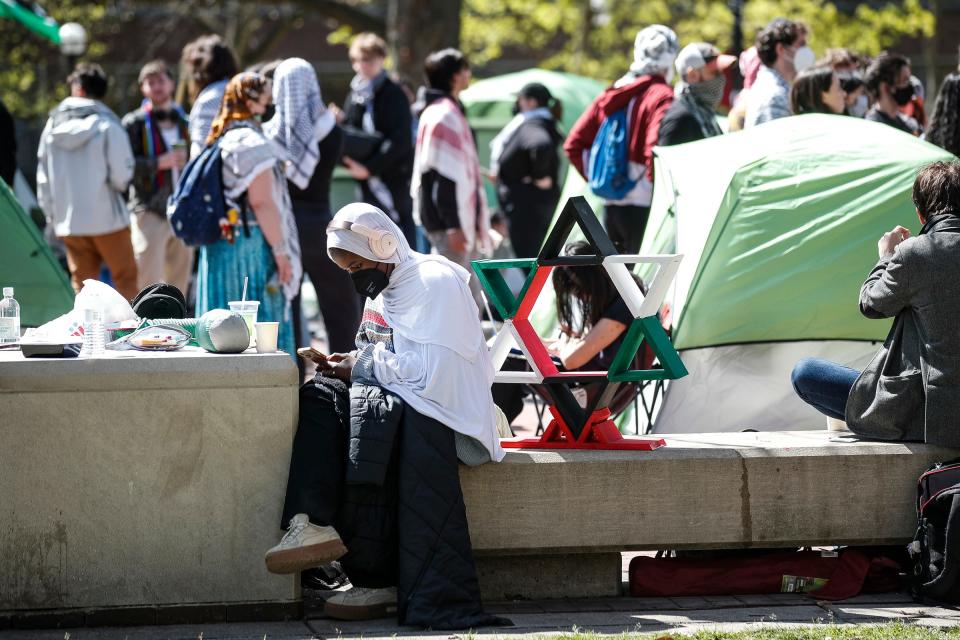
Ono said the university respects free speech, but added: "The university can and must regulate the time, place, and manner of expression to ensure one group’s right to protest does not infringe on the rights of others, endanger our community or disrupt the operations of the university."
Ono said the protests at the regents' homes on May 15 "went well beyond the lawful exercise of free speech."
But some criticized the police raid.
It was "absolutely shameful and unnecessary violence," said Sean Johnson, an assistant professor of astronomy at the University of Michigan in a post on X.
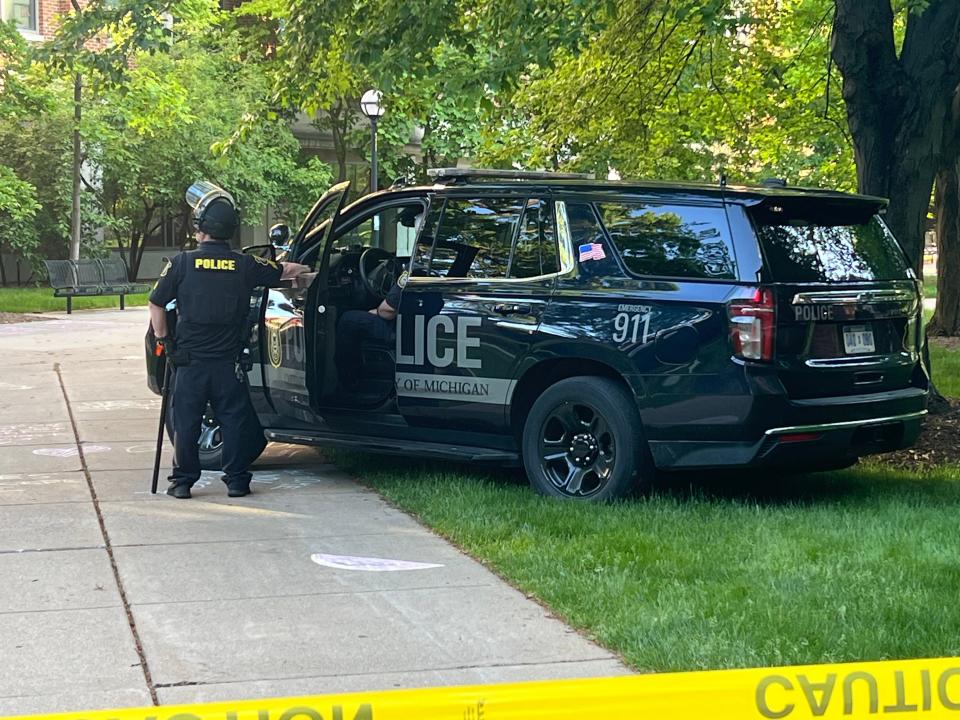
Ono called for productive dialogue that doesn't violate the rights of others.
"Moving forward, individuals will be welcome to protest as they always have at the University of Michigan, so long as those protests don’t violate the rights of others and are consistent with university policies meant to ensure the safety of our community," Ono said. "To be clear, there is no place for violence or intimidation at the University of Michigan. Such behavior will not be tolerated, and individuals will be held accountable."
Contact Niraj Warikoo: nwarikoo@freepress.com or X @nwarikoo
This article originally appeared on Detroit Free Press: University of Michigan encampment protest removed by police

